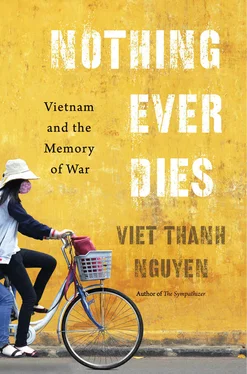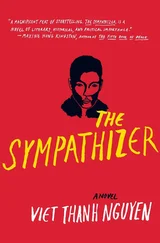the war in Vietnam “in itself” perhaps in fact never happened, it is a dream, a baroque dream of napalm and of the tropics, a psychotropic dream that had the goal neither of a victory nor of a policy at stake, but, rather, the sacrificial, excessive deployment of a power already filming itself as it unfolded, perhaps waiting for nothing but consecration by a superfilm, which completes the mass-spectacle effect of this war. 27
Baudrillard is not aesthetically wrong about the power of the story and the spectacle. He is just morally and ethically wrong. The war did in fact happen, and to suggest otherwise as he does only affirms the dread power of Western popular culture, its spectacles not even acknowledging the real bodies of the dead, only the dead extras on the screen.
Toni Morrison’s concept of “rememories,” from her novel Beloved , is useful here not only in clarifying the power of stories to both dismember the living and to bring the dead back to life, but to suggest that something needs to be done about such rememories. A rememory is a memory that inflicts physical and psychic blows; it is a sense that the past has not vanished but is solid as a house, present in all its trauma and malevolence. The most powerful kinds of stories, such as Close Quarters and Apocalypse Now , are rememories. Every time I thought of them, I experienced my readerly and spectatorial emotions all over again, intense feelings of disgust, horror, shame, and rage brought about by having witnessed what the scholar Sylvia Chong calls “the Oriental obscene.” 28My body trembled and my voice shook, an emotional testament to the aesthetic power of these works as well as to their participation in the discourse of the Gook, herself a rememory. It was not that I was forgotten in these stories or that I did not see my reflection; no, I saw myself, but as the other, the Gook, and that, I knew, was how others might be seeing me, not just the audiences chortling in movie theaters but even thinkers such as Baudrillard, for whom the dead are an abstraction to be dismissed in favor of the more interesting topic, the power of the war machine and its cinematic squadrons.
To be forgotten altogether or to be disremembered — these are the choices left to the Southeast Asians of the former Indochina in the discourse of the Gook, as well as any other Asians unfortunate enough to be mistaken for such a creature. Even Maya Lin’s aesthetic triumph, itself a rememory, speaks in this discourse, despite, or perhaps because, Maya Lin herself can be seen in this racist fashion. When one is in hostile or indifferent country, the safest way to survive is to be silent and invisible, or, in Lin’s words, to see things from a distance as a third-person observer, far from the crossfire. If her body is invisible in the memorial, so are all the bodies like it, the ones belonging to those Southeast Asians whose names are nowhere to be found in the memorial. Marita Sturken states the case clearly:
the Vietnamese become unmentionable; they are conspicuously absent in their roles as collaborators, victims, enemies, or simply the people on whose land and over whom (supposedly) this war was fought.… Within the nationalist context of the Washington Mall, the Vietnam Veterans Memorial must necessarily “forget” the Vietnamese and cast the Vietnam veterans as the primary victims of the war. 29
The memorial shows that “remembering is in itself a form of forgetting,” 30a mnemonic sleight of hand that many scholars of memory have observed, one that, in this case, substitutes fifty-eight thousand American soldiers for three million Vietnamese. As the photographer Philip Jones Griffiths observes, “Everyone should know one simple statistic: the Washington, D.C., memorial to the American war dead is 150 yards long; if a similar monument were built with the same density of names of the Vietnamese who died in it, [it] would be nine miles long.” 31This mnemonic reality for many Americans, where they and their soldiers are the victims, and not the three million Vietnamese, is nothing less than Orwellian.
But it is not only the Vietnamese who are invisible, forgettable, and unrecognized. The name of the Vietnam War erases other Southeast Asians, even from Sturken’s memory and sight (for if one cannot see people, one cannot remember them, and vice versa). Southeast Asians from Cambodia and Laos have not forgotten their living and their dead, as the poet Mai Neng Moua shows in her poem “D.C.”:
I stood my ground
It’s not enough that I am here
I want the imprints of their names
Some American proof that they were known
Their courage recognized
The sacrifices of their lives acknowledged.
Moua asks for recognition and acknowledgment of the Hmong soldier as a Vietnam veteran, just as South Vietnamese soldiers in the United States have done. 32
I know six who died there
Grandfather Soob Tseej Vws
Uncle Txooj Kuam Vws
Uncle Kim Vws
Uncle Looj Muas.
These foreign names must be spoken, must be written down, must be forced into the landscape of American sight, for recognition and acknowledgment only happen if one is remembered. In the absence of such recognition and acknowledgment, the forgotten and the disremembered must remember themselves, even if, as Moua concedes, memorial forms guarantee nothing. Tourists gathered
Around the memorial as if
It was an exotic exhibit
Talking loudly, laughing, downing
Their Evian in the humid heat
Disturbing the memories of chaos
Just another thing you do while you’re in D.C. 33
No aesthetic work is inherently powerful. Foreigners, youth, or the disinterested who do not carry these memories of the war may be unaffected, dismissive, blasé, bored, or unnerved. To them, and perhaps to the majority of future visitors, when living memory of the war is dead, the wall will be simply a wall.
Nevertheless, it is better to have a memorial that can be ignored than no memorial at all. Implicit in Moua’s poem is a common conviction among the forgotten and disremembered, which is that being forgotten, or forgetting others, is unjust, particularly if we are talking about a conflict in which it is in the interests of one side to suppress the memories of others. For the forgotten and disremembered, the important question is this: how can we recall the past in a way that does justice to the forgotten, the excluded, the oppressed, the dead, the ghosts? This question is central to an ethics of recalling others. It assumes both the injustice of forgetting others and the justice of remembering others. Ricoeur proposes the outlines for such an ethics of remembering others in his monumental Memory, History, Forgetting , where he argues that justice is a virtue always “turned toward others.… The duty of memory is the duty to do justice, through memories, to an other than the self.” And: “moral priority belongs to the victims.… The victim at issue here is the other victim, other than ourselves.” 34In short, justice always resides with remembering the other.
Ricoeur’s approach to memory is powerful and persuasive, at least for anyone invested in resistance against forgetting or the demands of subordinated people for justice. In a similar vein, critic Paul Gilroy calls for a “principled exposure to the claims of otherness.” 35Gilroy, like Ricoeur, and myself, too, advocates for the idea that “histories of suffering should not be allocated exclusively to their victims. If they were, the memory of the trauma would disappear as the living memory of it faded away.” 36That is, it should not purely be the burden of victims to remember the injustices done to them. Placing the weight of memory solely on these injured parties would encourage them to see themselves only in terms of victimization. Treated as objects of pity, the temptation for victims is to mistake their otherness as their sole identity — the most visible and the most disparaged kind of identity politics, although not the only kind. An ethics of recalling others is defined, paradoxically, by acknowledging that those we consider to be others are neither other nor ideal. Instead, in as much as we consider ourselves to be subjects, these others, from their own point of view, are subjects as well.
Читать дальше












